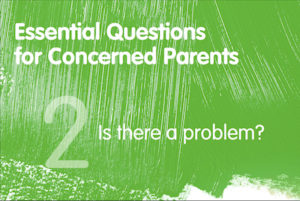 Let’s say that your child is exhibiting some sort of behavior, like restlessness, or having certain thoughts or feelings, like feelings of sadness. First of all, is it a problem?
Let’s say that your child is exhibiting some sort of behavior, like restlessness, or having certain thoughts or feelings, like feelings of sadness. First of all, is it a problem?
Is it a problem if, say, your child waits two months longer to speak than did Jane across the street? Why is that a problem as opposed to a natural difference? Is it a problem that he enthusiastically signs up for violin lessons and then wants to stop them after two weeks? Why is that a problem as opposed to a change of heart? Is it a problem that he doesn’t want to sit still at the dinner table where you and your mate are fighting? Why is that a problem as opposed to good common sense?
You can label any of these a problem—a developmental delay, a lack of discipline, a refusal to obey—but where is the love, charity, or logic in that? Be careful not to leap to the idea that something your child is doing, thinking, or feeling is a problem, even if it is something that scares you, for instance, that he or she is hearing voices. We are being trained to look at just about everything as problematic so that we can be sold chemical solutions and other “expert” solutions to that problem. There are huge industries out there needing us to call things problems. Take some time and do some investigating before you use the “p” word on something your child is exhibiting.
Read the Concerned Parents’ Project Introductory Post.
Read Question 1
To get in touch or to share your feedback, please email us.
Read more on this topic
Is Defiance a Medical Condition?
Visit Parent Resources for additional in-depth articles.














